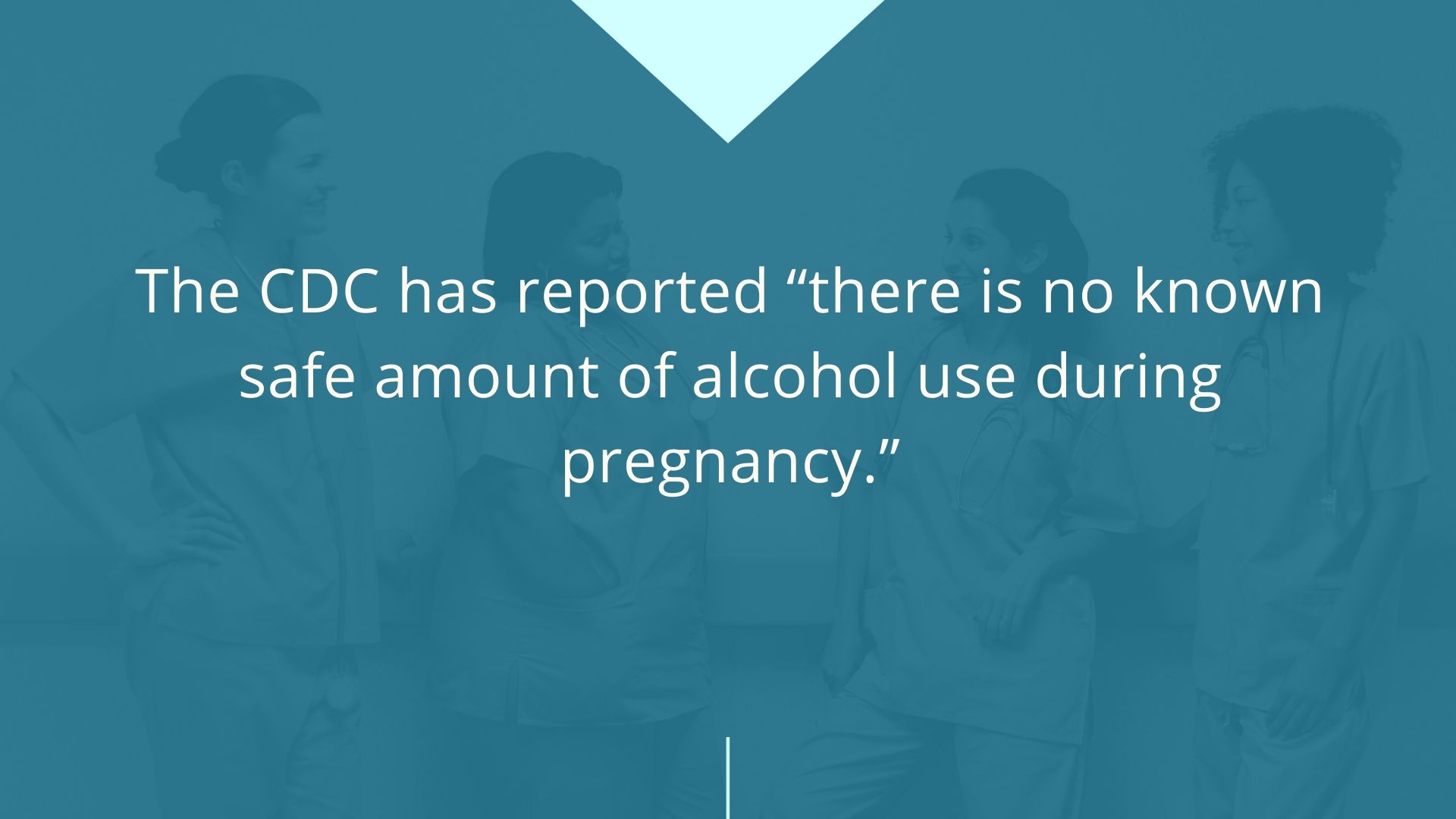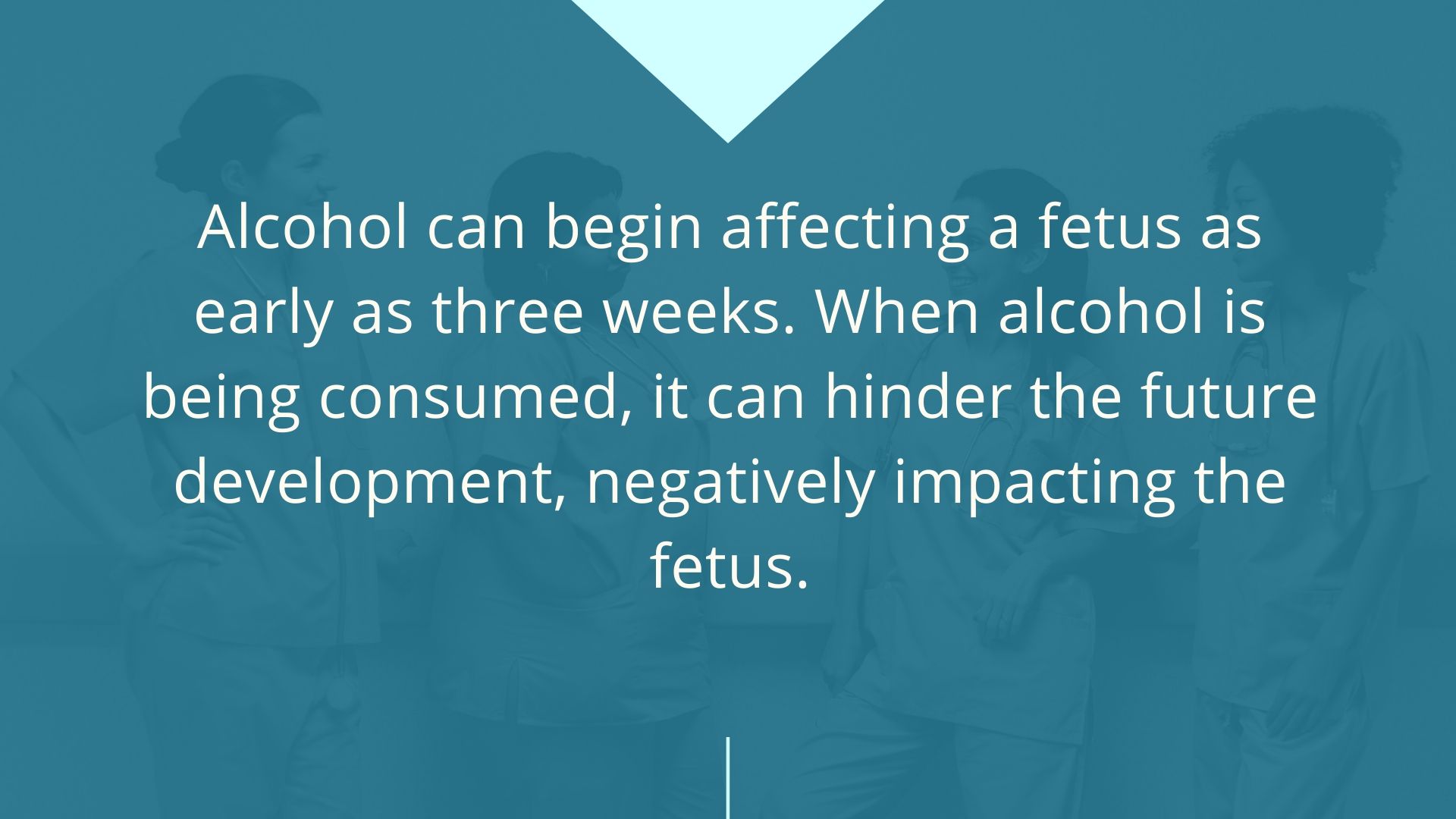Pregnant women face a number of challenges when expecting. They give their bodies over to a growing fetus, endure physical pain and upset, and also experience psychological effects that can complicate their everyday lives. For a pregnant woman who is not an alcoholic, these and other challenges can present themselves on a daily basis. Those women who are pregnant and are addicted to alcohol, however, face an uphill battle that could easily result in tragedy if they do not get help.

What are the Effects of Alcohol Consumption During Pregnancy?
The Centers for Disease Control and Prevention (CDC) report that “there is no known safe amount of alcohol use during pregnancy.” It is not recommended to drink alcohol at any point in pregnancy, as studies have shown that doing so can be harmful and/or fatal for the unborn child. This is because alcohol enters the bloodstream and passes through the umbilical cord, directly impacting the baby and its development.
The amount of alcohol that a pregnant woman consumes can dictate how severely the baby is affected. Generally, the more alcohol that is consumed, the greater the risk and vice versa. However, it is impossible to tell exactly how much a fetus will be impacted by alcohol, which is why remaining abstinent while pregnant is vital. Drinking while pregnant has proven to cause the following effects:
Low birthweight
A baby is determined to have low birth weight when he/she weighs less than 5 pounds 8 ounces. At birth, babies with low birth weight can suffer from several effects, including:
-
- Respiratory problems, specifically respiratory distress syndrome (or RDS) which occurs when the baby’s lungs are not developed enough to keep their air sacs inflated and oxygen therapy is required
- A problem with the baby’s digestive system known as necrotizing enterocolitis, which can lead to poor feeding, swelling in the belly, and not enough weight gain
- Cardiovascular complications, including patent ductus arteriosus (or PDA) which is the medical name for when the opening for blood vessels around the heart do not close correctly
Additional effects caused by low birthweight can include jaundice and increased risk for infections. Babies with low birth weight are at greater risk of experiencing additional problems later in life, such as heart disease, high blood pressure, and diabetes.
Birth defects
A baby born exposed to alcohol in utero can be born with birth defects. Many babies in this situation suffer from heart defects in the chambers, valves, septum, and arteries within the heart. Hearing loss due to problems within the inner, middle, and outer ear are also common, as are vision problems. Heart defects can be deadly and require immediate surgery while hearing and vision defects can jeopardize the quality of the baby’s life for the rest of his or her life.
Small head circumference
Some babies born to mothers who drank during pregnancy are born with a small head circumference. This denotes a deficiency in growth while in utero. While some babies may have smaller heads but do not struggle with any challenges within their brains, others are not so lucky. Some babies are born with microcephaly, which is when their head and brain have not fully developed. Since the brain did not fully develop, babies born with microcephaly often experience disabilities within their lives, including:
-
- Delays in crawling, walking, talking, and other major milestones
- Trouble with balance and movement
- Difficulty feeding
- Vision loss
- Hearing problems
- Intellectual disabilities
- Problems with everyday functioning
Begin Your Recovery Today at our Rehab for Pregnant Women
Premature birth
Babies born before 37 weeks are considered premature babies. This means that they were delivered sooner than the needed gestational period to fully develop. As a result of premature birth, countless complications can develop. Depending on how prematurely the baby was born, some effects can include:
-
- Underdeveloped vital organs
- Cerebral palsy
- Psychological problems
- Respiratory problems
- Inability to maintain body heat
- Gastrointestinal problems
- Anemia
- Jaundice
- Underdeveloped immune system
These are merely just some of the effects that premature birth can cause. It is important to recognize that these effects can produce symptoms of their own, further complicating the situation.
Miscarriage and stillbirth
A miscarriage occurs when a mother loses her baby prior to the 6-month mark. It is considered a stillbirth when the baby dies after 6 months. Drinking alcohol can increase the risk of either one of these effects to occur. It is common for women to miscarry early on in their pregnancy even without drinking, however, drinking during that time can compromise the development of the baby. Drinking later in pregnancy is dangerous, too, as alcohol can cause the baby to die in the womb, resulting in stillbirth.

At What Stage Does Alcohol Affect a Fetus?
Alcohol can begin affecting a fetus as early as three weeks. Between three weeks and eight weeks gestation, an incredible amount of development occurs. This includes the development of the heart, limbs, eyes, and central nervous system. When alcohol is being consumed, it can hinder this and future development, negatively impacting the fetus.
While we know that alcohol impacts unborn babies in many ways, there remains controversy over at what point in a woman’s pregnancy is drinking alcohol most dangerous. Some professionals say that drinking in the first few weeks of pregnancy is most destructive, while others will argue that drinking near term is riskier. Because of the unknowns, it is recommended that women who are pregnant do not drink at all while with child, as studies have reflected alcohol-induced harm in babies at all different times in the gestational period.
Can an Alcoholic Have a Healthy Baby?
Pregnancy is interesting, as it is so similar in so many ways for women across the planet, but also very different, too. Some women do everything within their power to ensure that their babies are born healthy (such as eating organically, drinking lots of water, getting enough rest, etc.). Other women struggle with challenges that cause their focus to shift to things other than their pregnancy, resulting in decisions that can negatively impact the fetus. It is not unheard of to see a healthy baby born to a mother struggling with alcoholism and an unhealthy baby born to a mother who has taken every possible precaution. Sometimes, these things are just out of the control of expecting women. This is why some women experiencing alcoholism can birth a healthy baby. It might sound crazy, but it is 100% possible.
Many factors go into the health of a growing baby, including the overall health of the mother, what she eats/drinks, what her genetics are, and so on. When women who are pregnant are addicted to alcohol, certain factors such as how much they drink, how often they are drinking, and what they are drinking can play a role in the health of their unborn baby. Keep in mind that being an alcoholic does not always mean drinking an excessive amount of alcohol within a short period of time all the time. A person can be an alcoholic but only binge on the weekends, have a few drinks every couple of nights or drink at odd times of day. There is no set definition of alcohol consumption that defines who is an alcoholic or not. Much of the disease of alcohol comes from psychological challenges, such as feeling unable to function without drinking. This is important to remember when discussing alcoholism in pregnant women, as it can not only explain the risks of drinking while pregnant but also explain the baby’s eventual outcome at the time of birth.
Even though there exists the possibility that alcoholic pregnant women can deliver a perfectly healthy baby, it is critical to encourage abstinence from alcohol when expecting. There is no sure-fire way to prevent alcohol-related harm of a fetus, and chances are, if a pregnant woman is drinking prior to the baby’s birth, the baby will experience some effects as a result.
Are You Pregnant and Need Help to Stop Drinking?
If you are struggling with the disease of alcoholism and are expecting, reach out for help right away. JourneyPure at the River has a treatment program for pregnant women. Every second counts, especially when you are pregnant. Do not allow another minute to go by where you could possibly put you or your unborn baby’s lives in harm’s way. We can help.
Call JourneyPure today. We can connect you with compassionate, experienced professionals who can walk alongside you during your road to recovery.
